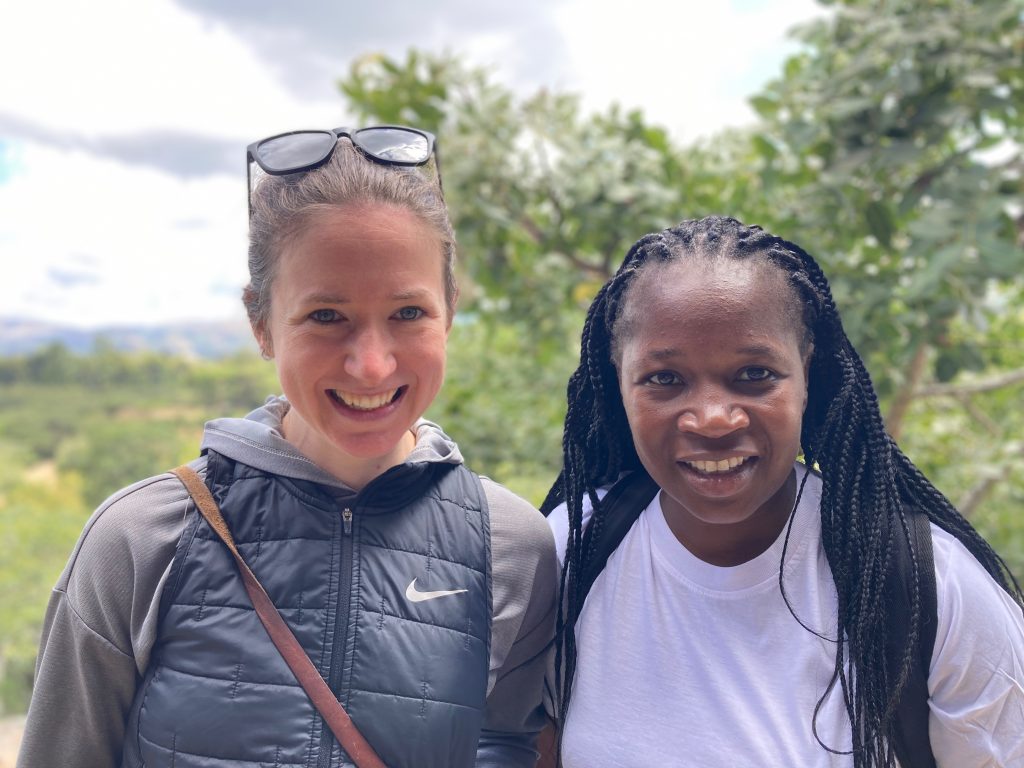Facing a substance use disorder epidemic, Zimbabwe’s health care system is struggling to provide care to patients. UW researchers describe their Population Health Initiative-funded study aiming to help change that by implementing a quicker, simpler screening tool to identify those in need of addiction treatment.

Helen Jack and Malinda Kaiyo-Utete
Drug and alcohol use has been surging across Africa, and researchers predict it will continue to rise. For African health systems to combat this epidemic, they must first identify who has a substance use disorder (SUD), but widespread stigma can discourage those struggling with addiction from seeking treatment. Now, a Population Health Initiative pilot grant has been awarded to a team of University of Washington and Zimbabwean researchers to test and validate an SUD screening tool in Zimbabwe.
“In this setting, substance use disorder is both a cause and consequence of poverty and poor health outcomes,” the researchers explain.
This “Z-SUAV: Zimbabwe Substance Use and Alcohol Validation” study will test and validate one-question SUD and alcoholism screening tools among a sample of 1,064 randomly selected patients seeking HIV care. The team will compare the results of the one-sentence questionnaires to the much longer interview guide, which probes about many symptoms of substance and alcohol use.
“Validating a brief screen for alcohol use in the local context of Zimbabwe is crucial for ensuring cultural relevance and accuracy,” said affiliate assistant professor Tessa Matson. “I’ve been impressed with Dr. Jack and the OPHID team’s efforts to tailor this tool to reflect local drinking patterns, societal norms, and language nuances. This will lead to more precise identification of at-risk individuals and enables targeted, meaningful interventions.”
Z-SUAV Principal Investigators:
- Helen Jack, Department of Medicine
- Malinda Kaiyo-Utete, University of Zimbabwe
- Tessa Matson, Kaiser Permanente Washington Health Research Institute, Department of Health Systems and Population Health
- Kudakwashe Takarinda, OPHID
- Emily Williams, Department of Health Systems and Population Health
The study will be conducted in partnership with the Organization for Public Health Interventions & Development (OPHID), a Zimbabwean non-profit organization that provides HIV care to over 300 public sector clinics. Z-SUAV builds on Dr. Helen Jack’s preexisting work with OPHID focused on enhancing mental health screenings and referrals. Seeking to integrate mental health care into HIV care, she and her collaborators created a “stepped-care pathway,” which was implemented in over 320 public health facilities.
Then, about a year ago, “OPHID collaborators brought up the fact that alcohol and substance use were a growing problem and not addressed in the existing services,” Jack explained.
Zimbabwe has struggled with rising substance use amidst an economic crisis exacerbated by both COVID-19 and HIV. Kaiyo-Utete also points to the breakdown of family structures causing more children to succumb to peer pressure to take drugs. “We say that a child is looked after by the whole village, but that is no longer happening due to globalization and migration from rural areas to the cities,” she explained.
“Validating a brief screen for alcohol use in the local context of Zimbabwe is crucial for ensuring cultural relevance and accuracy. I’ve been impressed with Dr. Jack and the OPHID team’s efforts to tailor this tool to reflect local drinking patterns, societal norms, and language nuances. This will lead to more precise identification of at-risk individuals and enables targeted, meaningful interventions.”
-Tessa Matson, affiliate assistant professor
Simplifying and streamlining the process of SUD care is vital, according to Webb. Zimbabwe has an overburdened, understaffed, and bureaucratic healthcare system in which citizens struggle to get care, she explained. Health care practitioners must also follow onerous local regulations surrounding paper documentation.
“A short tool is critical in this HIV care setting, where staffing and resources are so limited. But if the tool is not valid then it’s also a waste of resources, since it is not helping us detect new cases,” said Jack.
Because stigma can inhibit patients from seeking care, Z-SUAV is also working to ensure that screening tools use non-biased language and that administrators approach patients in a non-judgmental manner.
As Kaiyo-Utete explained, “No one really thinks of [SUD] as a medical condition that needs medical attention [in Zimbabwe]. People think that it is a psychological issue, that someone lacks self-control, and they choose to use the drugs anyway, so they should suffer the consequences.”
The researchers hope to incorporate their screening tools into the Zimbabwean Ministry of Health’s common practice.
Professor and director of the Health Services PhD program Emily Williams reflects, “It has been a huge pleasure to support Dr. Jack and her Zimbabwean colleagues in this effort. Dr. Jack is a rising star in her field, and the way she conducts partnered research is exemplary. For me, the joy of supporting Dr. Jack and colleagues in this work is coupled with deep excitement about addressing key issues in Zimbabwe—a country that is dear to me after having studied gender, social change, and politics there for several months in college.”